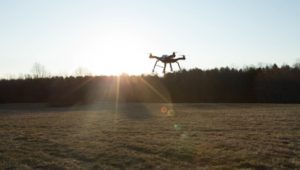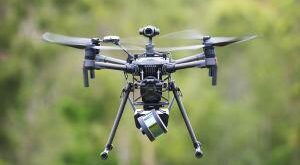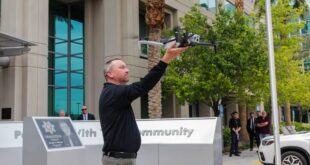By DRONELIFE staff writer, Jim Magill
Under current Texas state law, it is illegal to use a drone to capture an image of private property without the owner’s consent, unless you are a law enforcement office, a professor doing research, a surveyor, an employee of an oil and gas or power company, or someone covered by one of the more than a dozen other exemptions to the law.
Not included among these exemptions is using a drone to take photos as a journalist, or a property owner using drone photography or videography to ensure that a neighboring property is not impacting or polluting the drone operator’s land.
The Texas law is considered one of the strictest in the country in terms of drone use by journalists and non-commercial actors.
Last September two groups representing journalists filed a federal suit in US District Court for the Western District of Texas Austin Division challenging the Texas law. The suit, filed by the National Press Photographers Association, the Texas Press Association and photojournalist Joseph Pappalardo, names as defendants director of Texas Department of Public Safety, chief of the Texas Highway Patrol and the district attorney of Hays County, Texas and seeks to overturn substantial parts of Chapter 423, the law passed in 2013 regulating unmanned aerial vehicles.
The plaintiffs allege that the law, which seeks to protect Texans’ privacy rights by prohibiting the use of drones for “surveillance” is unconstitutionally vague in the it doesn’t provide a definition for “surveillance.”
James Hemphill, an Austin-based attorney representing the plaintiffs, argues the that the law violates the First Amendment by restricting the use of drones in pursuit of legitimate newsgathering activities.
“The First Amendment protects newsgathering activities. The government can’t unduly restrict the ability to gather news without some kind of important countervailing interest,” he said in an interview.
Attorneys for the state defendants argued in a court filing that the law merely upholds citizens right to privacy and the plaintiffs in the case “merely seek to denude that right by holding that such interests are irrelevant when they conflict with a journalist’s desire to record a private citizens’ activities, or to endanger critical infrastructure with drone interference.”
An amendment to the bill, added in 2017, prohibits flying a drone at heights below 400 feet over “a correctional facility, detention facility, or critical infrastructure facility.” Since Federal Aviation Administration regulations bar the operation of drones above 400 feet, the measure effectively bans the use of unmanned aircraft from flying over the listed facilities, which include refineries, power plants, chemical plants, water treatment facilities, telecommunication switching stations and animal feedlots.
State Representative Drew Springer, who authored the amendment, said it was necessary to protect the state’s critical infrastructure from potential drone-related mischief, such as approaching too close to a cell-phone tower. “You bang into it and shut down everybody’s cell signals for eight hours and cost tens of thousands of dollars, just from playing around with it,” he said.
Likewise, the provision regarding feedlots was designed to protect the state’s food supply from attacks using drones, he said. “It’s easy to infect a whole herd of cattle with hoof and mouth, if someone wanted to be a vegan terrorist.”
However, National Press Photographers Association attorney Alicia Wagner Calzada said including cattle feedlots as critical infrastructure makes the Texas drone law similar to other states’ “ag gag” laws, which prohibit undercover photography of agricultural operations. “That’s an example of a law that seems clearly designed at limiting the ability to gather information of public concern,” she said.
Wagner said one of the fundamental flaws in the Texas drone law is that it criminalizes the use of drones for capturing images that could be obtained legally by other means. “I could be sitting in my 13th floor office building, stick my camera out the window and see property for half a mile around and I can take a picture,” she said. “If I stand on the sidewalk next to the building, lift my drone up and take the exact same picture, it’s against the law.”
Unfortunately, Texas drone laws are not likely to be changed soon to satisfy the concerns raised by free speech advocates. Leah M. Nicholls, an attorney with Public Justice P.C. who represents the plaintiffs in the federal lawsuit, said the suit represents “a many years-long litigation.”
Meanwhile the state Legislature, which is scheduled to reconvene in January 2021, could tackle the First Amendment issues raised in the federal suit. However, a charge to the state Senate by Lieutenant Governor Dan Patrick signals that any drone legislation considered by that body should focus on facilitating commercial package delivery by drone.
Miriam McNabb is the Editor-in-Chief of DRONELIFE and CEO of JobForDrones, a professional drone services marketplace, and a fascinated observer of the emerging drone industry and the regulatory environment for drones. Miriam has penned over 3,000 articles focused on the commercial drone space and is an international speaker and recognized figure in the industry. Miriam has a degree from the University of Chicago and over 20 years of experience in high tech sales and marketing for new technologies.
For drone industry consulting or writing, Email Miriam.
TWITTER:@spaldingbarker
Subscribe to DroneLife here.
https://dronelife.com/2020/07/22/texas-drone-law-places-severe-restrictions-on-aerial-photography-videography/
 Unmanned Aerial Vehicle The latest drone news
Unmanned Aerial Vehicle The latest drone news




